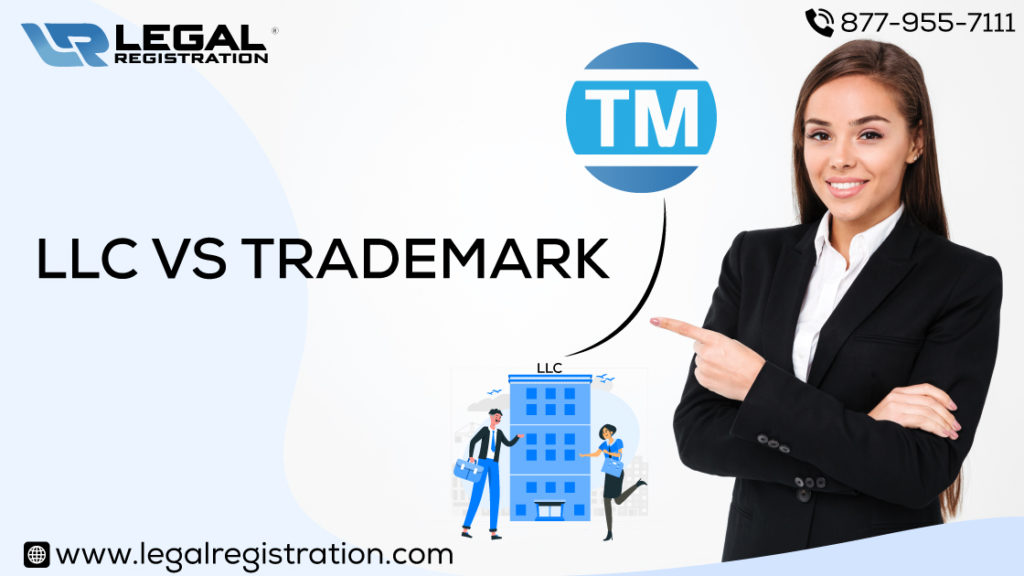LLC VS Trademark: The Difference and Other Things You Should Know


Is trademark and llc the same
The use of trademarks is the best way to ensure the protection of your LLC brand. A trademark and LLC are not the same, although both are closely interconnected. In this blog post, you will explore the difference between both, and the ins and outs of LLCs and trademarks.
What is a Trademark?
Any special feature whose purpose is to make your brand identifiable in the marketplace is a trademark. Below are examples of trademarks:
- Words and phrases
- Logos and pictures
- Artwork
- Names
A trademark helps signify the source of goods and the provider of services.
What is LLC?
A limited liability company is abbreviated as LLC, and it is a type of business in which owners cannot be personally prosecuted in case of a lawsuit. An LLC is very much like a corporation, however, the administrative responsibilities, such as board meetings are not mandatory.
LLC VS Trademark: What is the Difference between LLC and Trademark
You may be wondering if the trademark and LLC are the same. Although LLC and trademarks do share key similarities, both are fundamentally different. In the points below, you will learn the core difference between both:
Legal Protection
LLCs and trademarks are both essential parts of a business entity. However, the aim of getting both are entirely different. On the other hand, LLCs are legal business entities that ensure the protection of the owner’s personal assets in cases of litigation and bankruptcy. On the other hand, a trademark protects the intellectual property of the business. Through LegalRegistration.com, you can form an LLC in no time.
State Level VS. Federal Level Registration
In the United States, there are two types of trademark registrations, one is state-level, and the other is federal. Similar to an LLC, a state trademark binds the owner of the entity to submit paperwork to state authorities and pay the fees.
Also, a trademark registered with state authorities will not be protected outside the state boundaries – which is not the case with an LLC. However, a USPTO trademark – meaning a trademark that has been registered with the United States Patent and Trademark Office (USPTO) ensures strong legal security of intellectual property. This way, your entity can use its logo and other intellectual property anywhere in the United States.
Filing Expenses and Requirements
You can register an LLC entity in less than a week in the majority of states. Whereas, a federally protected trademark can take up to a year to register. For additional information What services do we provide?
What to Get First 3 Important
You may be thinking, should I get a trademark or LLC first? Generally, a logical step would be to establish or form a business before applying for a trademark. The intention for doing so is that the trademark is going to be owned by someone, and usually, you will want the LLC business, in order to be the owner of the trademark.
Also, in case you are more interested in acquiring federal protection for the trademark before bringing your business into the sight of customers. Then it is wise to apply for the trademark first. How Long Does It Take To Get an LLC?
3 Important Aspects in the Formation of an LLC
Several of the procedures needed to create an LLC are listed below. Please verify with your state, though, since they can have extra papers and requirements.
1- Pick a name
The business name must adhere to state regulations in the jurisdiction where the LLC will be created. Additionally, the name picked must already be a registered and recognized business name.
2- Make a registered agent yours
Your LLC could be required to have a registered agent, who will handle any legal paperwork on the LLC’s behalf in the event of a lawsuit. A list of nearby businesses that can serve as registered agents ought to be available at the Secretary of State’s office in your area.
3- Articles of incorporation should be submitted to the Secretary of State’s office in your area
A certificate of formation or certificate of the organization may also be used to refer to the articles of incorporation. Each state may have particular criteria for articles of organization, which are basically legal documents that define the fundamental facts about the business. However, the majority of states typically demand the following: the LLC’s name and address, its general purpose statement, a list of its owners, and the name and address of its registered agent. Get more information Sole Proprietor


